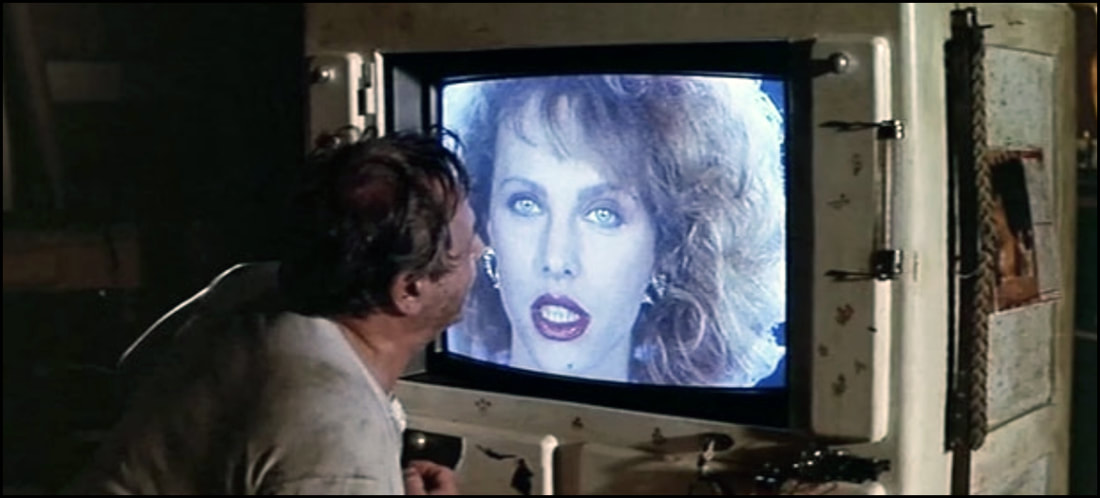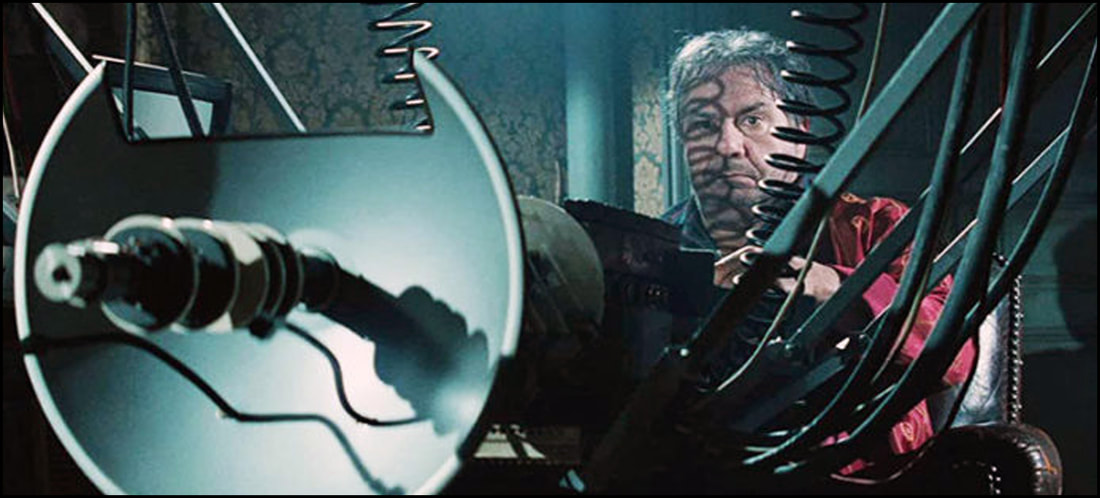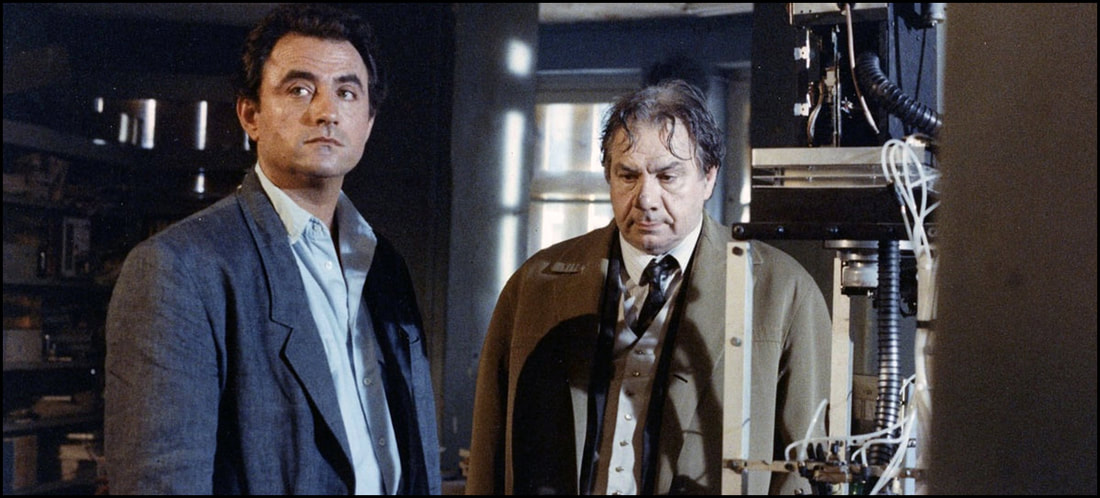While essentially there’s nothing wrong with this – each of us is perfectly entitled to champion whichever and whatever flick ‘floats your boat’ (as they say) – I do try to approach these pictures with kid gloves. Seeing what someone else has seen in a story or a performance can be tricky business. My filters have me attuned to pick up only what works for me, so I do try to exercise of modicum of caution when finally getting the opportunity to sit down with something that’s been touted for so long as a ‘hidden gem.’ After all, there are plenty of reasons why one film might resonate with you and fail to strike a chord with me, and I think my exercised restraint has served me well over the years.
And – for the record – I’ve lost count of the number of times Kamikaze (1986) has been recommended to me by others or has stumbled over in some reading. It’s certainly popped up dozens of times that I can think of, and I think most of its reputation is owed to the fact that the project was an earlier work stemming from the creative mind of Luc Besson. While not his first screenplay, it definitely rates as one of his earlier properties, and it came about well before he rose to prominence with such pictures as The Big Blue (1988), Leon: The Professional (1994), and The Fifth Element (1997). Viewed entirely against the backdrop of a genre legend in transition, I suppose many who saw Kamikaze back in the day might’ve remembered the name and, thus, granted the feature some extra goodwill as each of us are wont to do from time-to-time.
Thanks to the good people at Kino Lorber, I’ve finally had the privilege of digesting one of Besson’s early attempts … and it’s easy to see why some have awarded it with such revered status. Though I may not find it as significant as others, I do have something to say about its place and time that might reflect on a cinematic trend of that era, so stay tuned for after the break …
(NOTE: The following review will contain minor spoilers necessary solely for the discussion of plot and/or characters. If you’re the type of reader who prefers a review entirely spoiler-free, then I’d encourage you to skip down to the last few paragraphs for the final assessment. If, however, you’re accepting of a few modest hints at ‘things to come,’ then read on …)
From the film’s IMDB.com page citation:
“A crazy old and bored scientist invents a system which allows him to reach through the airwaves and transform live TV cameras into weapons to kill whoever is being filmed.”
Chiefly, I’m talking about Tech Noir, an emerging sub-genre popularly defined from such 1980’s films as Ridley Scott’s Blade Runner (1982, James Cameron’s The Terminator (1984), and Paul Verhoeven’s RoboCop (1987). Certainly, there are other features that demonstrate this theatrical trend of questioning the benefits and detriments of emerging technologies, yet I’ve personally always looked at these three flicks as really building a solid foundation upon which the house that becomes Tech Noir is built. Director Didier Grousset’s Kamikaze is modest with its special and practical effects by contrast, but an examination of its central villain – unemployed scientist Albert (played by Michel Galabru) – uncovers striking similarities to the themes of those meatier pursuits.
In film’s opening, Albert – who apparently works in electronics and/or robotics, it’s never quite clear – is fired by letter. His thirty years of service means nothing to the big corporation, and he’s summarily excused from his position when an office lackey shows up with written confirmation that his post has been terminated. Because – as a man – he’s been reduced to little more than a faceless cog in the industrial machine, Albert dutifully but begrudgingly packs up his meager belongings and heads for home, where he announces to his live-in nephew and niece that his career is over. While they go about the business of living life to the fullest (apparently with no jobs but plenty of free time for holidays), Albert shuts himself in with little more than a television set to while away the endless hours.
As a consequence of being reduced to nothing, Albert has no choice but to direct his growing resentment with mankind at the talking heads on the Boob Tube. Being somewhat overweight and unattractive, the inventor grows increasingly angry with one television commentator after another – all of which happen to be female and, more likely, the kind of females that would spurn the attractions of a somewhat overweight and unattractive male of Albert’s age – so he concocts a scheme to have them not only removed from his life but all of mankind. Using the only gifts he has – his genuine intellect – the scientist devises a death ray that utilizes television broadcast frequencies in order to kill off these adversaries one by one. These murders happen on live television, on camera for the home audiences to serve as witnesses.
In Ridley Scott’s aforementioned Blade Runner, the replicant Rachel has evolved to the point wherein it no longer knows much less questions what it is or who it is.
Similarly, Albert – presumed to be a man of pure science – has lost touch with most if not all of his own humanity. As we’re given no other backstory upon which to evaluate his nefarious motivations, I think it’s safe to assume he’s a man who has spent his life among machines, building and perfecting them to serve some basic function. Having spent little to no time among humans, he consequently sees them as little more than obstructions to his preferred way of life. He cannot – and chooses not – to relate to them. In fact, all we see of his interactions with family is constant struggle and constant disappointment; they do not adhere to his imposed standards, so removing them from his life is merely a passionless solution – the logical conclusion to an ineffective relationship. Though one could argue that shreds of a moral core still exist (Albert clearly knows what he has done is wrong and unlawful in the last reel as evidenced by his attempts to, first, misdirect the police and then flee for his safety), he no longer responds to those impulses. Instead, he reverts to his core programming of inventing machines to perform his bidding. He uses his genius to serve his dark, perhaps sometimes misogynist desires – now that he’s free of his corporate overlords – and this becomes his sole purpose.
Setting aside the cerebral influences, Kamikaze is a pretty solid thriller with some mild comic flair thrown in for good measure. It’s cleverly shot, and – while not all of the science is perfectly accessible – it’s assembled in such a way as to make it both prescient and entertaining. Richard Bohringer also stars as the police inspector who both uncovers Albert’s scheme and races to stop him before it’s too late, and Dominique Lavanant turns in good marks as the comely government official who might inadvertently fall victim if they can’t stop him soon enough.
Kamikaze (1986) was produced by ARP Sélection, Gaumont, and Les Films du Loup. DVD distribution (for this particular release) is being coordinated by the reliable folks at Kino Lorber. As for the technical specifications? Though the packaging doesn’t list any remastering of this, I thought that the sights and sounds were actually all very, very good. Images are definitely crisp – meaning this had some excellent cinematography for the period – and the soundtrack is reasonably clear and vibrant. Lastly, if you’re looking for special features? The disc boasts an audio commentary by film historian Eddy Von Mueller, a director’s interview, and a documentary on the making of the picture, along with the usual coming attractions. It’s a very solid collection that should keep fans interested for some time.
Highly recommended.
Kamikaze is a film that – somehow – I’ve heard a great deal about over the years that I’m finally delighted to have seen. Not only is it a biting satire on the dangers of consuming too much television but also the film is a testament to the budding career of Luc Besson (who crafted the screenplay). As can happen with projects that blend genres, there’s just enough science to make it SciFi – along with just enough humor to make it a dark comedy – but adding noir sensibilities (with just a touch of Tech Noir) elevates this nearly to point of making it a ‘must see’ for fans of 80’s techno thrillers.
In the interests of fairness, I’m pleased to disclose that the fine folks at Kino Lorber provided me with a complimentary Blu-ray of Kamikaze (1986) by request for the expressed purposes of completing this review. Their contribution to me in no way, shape, or form influenced my opinion of it.
-- EZ




 RSS Feed
RSS Feed